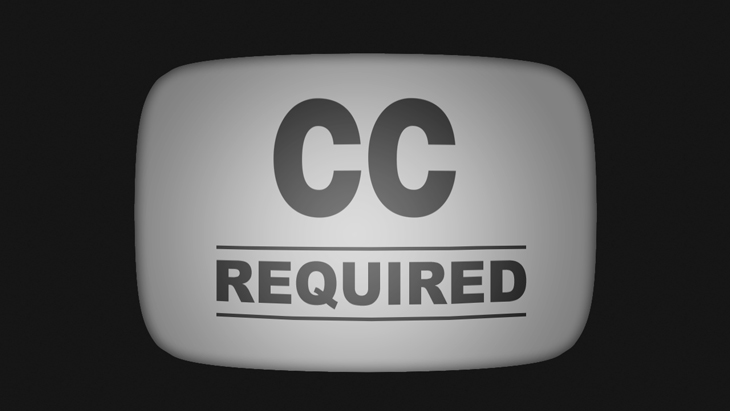Broadcast
With only a few exceptions, all programming for broadcast in the United States must be closed captioned. The rules for the requirement of closed captions were directed by the U.S. Congress in the Telecommunications Act of 1996 and became effective starting in 1998. Since then, the required amount of captioning has been steadily increasing. Today, nearly 100% of all English and Spanish language programming is closed captioned.
The FCC has created a fact sheet for more information on closed captioning for broadcast. It tells exactly what closed captioning is, who has to provide it, and what media are affected by the laws. The fact sheet also has information about how to file a complaint if someone isn’t following captioning rules and, if you’re a provider, some ideas for how not to become the recipient of such complaints. The fact sheet can be found here.
Federal and State Electronic Information Technology (EIT)
Federal agencies must make their electronic and information technology (EIT) accessible to people with disabilities as required by Section 508 of the Rehabilitation Act, a piece of legislation that was strengthened by the Workforce Investment Act of 1998. In part, Section 508 requires that “all training and informational video and multimedia productions which support the agency’s mission, regardless of format, that contain speech or other audio information necessary for the comprehension of the content, shall be open or closed captioned”. For more information, visit http://www.section508.gov.
In addition, the Americans with Disabilities Act (ADA) requires state and local governments to ensure effective communication with individuals with disabilities where necessary to ensure that communications with individuals with hearing, vision, or speech impairments are as effective as communications with others. The public entity must provide appropriate auxiliary aids.
This means that, one way or another, government has to make all of the information available to all people. This may mean providing a transcription of a meeting after the fact. Many state and local governments are opting instead to caption webcast meetings so that hearing-impaired citizens can participate in much the same way as any hearing person.
The Future
There is currently a movement to pass legislation that will define and regulate accessibility for developing technology. H.R. 3101 was introduced in June 2009 by Edward Markey (D-MA). Called the “Twenty-First Century Communications and Video Accessibility Act of 2009,” this legislation will, if enacted, amend the nation’s Communications Act. With more than 240 national, state, and community-based organizations supporting the legislation, and with telecommunications becoming more essential to our daily lives all the time, it looks like it won’t be long before captions will be required across all forms of visual media.
Update:
The 21st Century Communications and Video Accessibility Act was signed into law in October 2010. For more updated information, please click here.

Ben Kalb
Ben is a broadcast engineer and creator of StationDrop. With a longevity in the broadcast industry, over 20 years, Ben has experience with everything from 1” tape reels to completely file-based workflows. Recently, Ben has broken into the world of coffee. Ask him about his latest brew.


